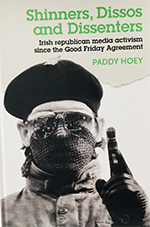Anthony McIntyre's Blog, page 1147
May 5, 2018
The Morning Bobby Sands Died
Alec McCrory recalls his emotions on this day 37 years ago when the young IRA leader, Bobby Sands, died after 66 days on hunger strike.
This morning while enjoying a quiet cup of tea before the house came to life, I thought back to this day 37 years ago in the H-Blocks.
I was returned to the wing having completed three days in the punishment block on suspicion of receiving contraband on a visit; tobacco wrapped in clingfilm.
That weekend we awaited the death of our young leader and comrade Bobby Sands on hunger strike. He was in the final stage of his epic battle and his precious life hung by a thread.
The unthinkable stared us in the face and we were ill prepared for it coming. Years of torture and brutality did not help to soften the crippling blow or to ease our deep feelings of loss. A raw anger burned within us at this gross injustice.
Bobby was the best we had to offer; followed by nine other of our bravest.
The cell block orderly, an ordinary prisoner from the Ballymurphy area, whispered through the cell door that Bobby had died in the early hours of the morning. It was like being hit with a sledgehammer on the chest. All I could do was take deep breathes until the pain subsided.
Shortly breakfast arrived, but I could not but eat it. My comrade had died after more than 60 days without food so that to eat breakfast seemed like betrayal. Eating anything at that moment was wholly inappropriate.
On my return to the wing, I was met by a deathly silence, no pun intended.
My cell mate, Tom McVeigh, greeted me with a somber expression not realising I had heard the news already. I wrapped the blanket around my naked body and sat on the bed. We talked about what was sure to happen on the streets as the impact of Bobby's death sunk in, but our main thoughts on that fateful morning were of a courageous, loving family who had kept a pledge to support their son and brother until the bitter end.
 Alec McCrory is a former republican prisoner and blanketman.
Alec McCrory is a former republican prisoner and blanketman.


This morning while enjoying a quiet cup of tea before the house came to life, I thought back to this day 37 years ago in the H-Blocks.
I was returned to the wing having completed three days in the punishment block on suspicion of receiving contraband on a visit; tobacco wrapped in clingfilm.
That weekend we awaited the death of our young leader and comrade Bobby Sands on hunger strike. He was in the final stage of his epic battle and his precious life hung by a thread.
The unthinkable stared us in the face and we were ill prepared for it coming. Years of torture and brutality did not help to soften the crippling blow or to ease our deep feelings of loss. A raw anger burned within us at this gross injustice.
Bobby was the best we had to offer; followed by nine other of our bravest.
The cell block orderly, an ordinary prisoner from the Ballymurphy area, whispered through the cell door that Bobby had died in the early hours of the morning. It was like being hit with a sledgehammer on the chest. All I could do was take deep breathes until the pain subsided.
Shortly breakfast arrived, but I could not but eat it. My comrade had died after more than 60 days without food so that to eat breakfast seemed like betrayal. Eating anything at that moment was wholly inappropriate.
On my return to the wing, I was met by a deathly silence, no pun intended.
My cell mate, Tom McVeigh, greeted me with a somber expression not realising I had heard the news already. I wrapped the blanket around my naked body and sat on the bed. We talked about what was sure to happen on the streets as the impact of Bobby's death sunk in, but our main thoughts on that fateful morning were of a courageous, loving family who had kept a pledge to support their son and brother until the bitter end.
 Alec McCrory is a former republican prisoner and blanketman.
Alec McCrory is a former republican prisoner and blanketman.

Published on May 05, 2018 09:30
Radio Free Eireann Broadcasting 5 May 2018
Martin Galvin
with details of this weekend's broadcast from
Radio Free Eireann.
Radio Free Eireann will broadcast a special two hour pledge program today Saturday May 5.
This will be a special two hour pledge program featuring author T.J. English discussing his new book.
Please pledge and show the Station Managers that you want to keep WBAI 99.5 and Radio Free Eireann on the air!
John McDonagh and Martin Galvin co- host.
Radio Free Eireann is heard Saturdays at 12 Noon New York time on wbai 99.5 FM and wbai.org.
It can be heard at wbai.org in Ireland from 5pm to 6pm or anytime after the program concludes on wbai.org/archives.



This will be a special two hour pledge program featuring author T.J. English discussing his new book.
Please pledge and show the Station Managers that you want to keep WBAI 99.5 and Radio Free Eireann on the air!
John McDonagh and Martin Galvin co- host.
Radio Free Eireann is heard Saturdays at 12 Noon New York time on wbai 99.5 FM and wbai.org.
It can be heard at wbai.org in Ireland from 5pm to 6pm or anytime after the program concludes on wbai.org/archives.



Published on May 05, 2018 01:26
A Morning Thought (14)
Published on May 05, 2018 00:30
May 4, 2018
Shinners, Dissos and Dissenters
Christopher Owens reviews a recent book that focuses on online republican writing.

Once again, the world of academia delivers another sterling book on the conflict that examines an angle never fully explored by those knee deep in reporting: the role of dissident and dissenters in republicanism.
With this book, Paddy Hoey takes a look at how republican media (from DIY magazines, through to An Phoblacht/Republican News, the early days of the internet and social media) has not only shaped the republican message but also fits into a long strand of alternative thinking in the media (also known as "mosquito press).
Over 224 pages, Hoey goes through the major dissident/dissenter groups and demonstrates how republicanism is (to misquote Steve Bruce and Gareth Mulvenna) a central reservation which cut through various and often transient political, military, intellectual and emotional journeys. How else could you have people like Gerry McGeough and Tommy McKearney in the same movement (the section involving McGeough's own publication, The Hibernian, did give me a good laugh)?
The chapter which incorporates Fourthwrite and The Blanket (an earlier version appeared on this very site in 2012 http://thepensivequill.am/2012/09/the...) gives both organs the respect they deserve for allowing republicans to articulate their viewpoints without fear of censorship and for being a thorn in the side of the mainstream republican media.
Tracing their beginning to the early online message boards and guest books recalls a time when the internet was not the corporate behemoth it is today, but a collection of dissenting views on anything from UFO's to sexual deviancy. Reading it made me strangely nostalgic for this period, and made me realise how much we've given up in the way of privacy for the conveniences of modern life.
One thing Hoey is convinced of is his belief that, for all the great work Fourthwrite and The Blanket did, none of the contributors were able to offer a genuine alternative. He quotes Brendan Hughes to emphasise this point: “I don’t have an alternative, people keep saying to me if your (sic) going to criticize put up an alternative. I don’t have an alternative, the alternative is within the republican movement.”
This has already been rejected on this very blog http://thepensivequill.am/2012/09/som... , and to me, Hoey overlooks the fact that the period 1998-2008 was a time when republicans had the carpet pulled from under their feet. Everything they thought they had been fighting for and who they believed in was now up for debate. Under the circumstances, is it really any wonder that the focus turned inward?
Similarly, he notes that The Blanket had an ambivalent relationship with dissident groups, condemning the violence but carrying their statements. Unfortunately, Hoey is reluctant to not only put this down to The Blanket's policy of allowing people to speak their mind, but he also doesn't allow for the thought that, by carrying such statements, the discussions around them centred around the futility of what they were doing. So, by carrying such statements, The Blanket (it could be argued) did their bit in dissuading people to take up arms.
The examination of both the political fortunes and social activism of Eirigi and Republican Network for Unity are concise and demonstrates just how vast the scope of republicanism can be if applied correctly. The influence of punk rock on Eirigi's Situationalist type stunts and it's media exposure is something that I would have welcomed more of (as an aside, the revelation that Carrie McIntyre was influenced by the legendary Flipside fanzine made me smile, even though I'm more of a Maximumrocknrolland Forced Exposure man myself), but the coverage is still insightful enough. Interestingly, there's no reference to both organisations seemingly being moribund these days, although Hoey does write about their difficulties at the polls and on the streets.
His attitude towards Sinn Fein focuses more on their political adventures in the south, and how their campaigning fits into the traditional left dissenting voice (despite implementing Tory cuts in the North) is quite a contrast from Matt Treacy's view of them in 'A Tunnel to the Moon' as a politically promiscuous party, willing to jump on whatever bandwagon there is in order to further votes. Although Hoey acknowledges the contradiction, he's still a little too in thrall to SF for my liking. However, since the party are now the largest nationalist party in the North, and making significant progress in the south, he can easily make the point that the party have succeeded where others have failed. Of course, that leads into another argument, and maybe outside of the scope of the book.
At £75 for 224 pages is hard to justify, but it is an excellent read that is not only entertaining, but thought provoking and informative. Long may these strands of books continue to hit the shelf.
Paddy Hoey, Shinners, Dissos and Dissenters: Irish Republican Media Activism Since the Good Friday Agreement Manchester University Press ISBN-13: 978-1526114242


Published on May 04, 2018 02:30
A Morning Thought (13)
Published on May 04, 2018 00:30
May 3, 2018
Theologies Of Genocide And Earth Day Ethics
Dr. Brooks Berndt with a piece from Tikkun on Theologies of genocide.
 Children marching for climate justice in 2017. Image courtesy of Lorie Shaull.
Children marching for climate justice in 2017. Image courtesy of Lorie Shaull.
While waiting to speak at an environmental event earlier this year, another speaker told me a fascinating story. As part of his work for a university program dedicated to energy research, he invited a prominent fossil fuel executive to a graduate-level seminar. For the class, these sharp and highly informed students prepared themselves with arguments to deftly rebut the climate denialism they fully expected to confront. The actual encounter, however, went different than they anticipated. The executive befuddled them with heart-felt declarations of how his corporation was doing the will of God. The students did not know how to respond.
Almost a week after hearing this story I found myself speaking to a group of church youth about climate change. One of the youth who appeared to be about 12-years of age arrived with a passionate zeal to do intellectual battle with me. Evidently, the description of the workshop had motivated him to attend so that he could disabuse me of my ideas about climate change. From the very beginning, he wanted me to know that God gave us fossil fuels, so that we—humanity—could use them. I patiently put forth the perspective that a loving God would not want humans to suffer on a large scale so that we could burn fossil fuels. I did not expect to win him over, but I did want to offer a theological framework for the other youth to interpret and assess such views.
In the case of this youth, the theology espoused is transparently a theology of genocide. It involves a view of God that justifies actions that cause and will cause human death and suffering to an enormous and horrifying extent. Yet, the theological statements espoused by corporate executives and present members of the presidential cabinet can sometimes sound more like theological candy than theological poison. The EPA’s Scott Pruitt would have us believe that the burning of fossil fuels provides an opportunity to bless humanity, not curse it.
Seminary professor Leah Schade provides a compelling biblically-based rebuttal to Pruitt that posits a different blessing—one that is revealed in the story of Adam and Eve in the Garden of Eden. It is “the ability to discern how to live within the natural boundaries God has set for us.”
Pope Francis had it right. Planet earth is our common home. We don’t want our home to become the planetary equivalent of the gas station bathroom from hell just because of some bizarre moral notion that God has blessed us to spew atmospheric excrement into the air.
In a sense, Earth Day should be both a house party and a house cleaning party. We should celebrate our magnificent home, and we should be inspired to serve as caretakers of it. This requires that we all do our part, and it requires that we have a leader at the EPA who clearly embodies the caretaking ethic required of us. Instead of serving the fossil fuel industry, we need someone who serves the public by tending to the beautiful world around us. Our present health and our future wellbeing depend upon it.
The Rev. Dr. Brooks Berndt is the Minister for Environmental Justice for the United Church of Christ. He can be found on Twitter as The_Green_Rev.


 Children marching for climate justice in 2017. Image courtesy of Lorie Shaull.
Children marching for climate justice in 2017. Image courtesy of Lorie Shaull. While waiting to speak at an environmental event earlier this year, another speaker told me a fascinating story. As part of his work for a university program dedicated to energy research, he invited a prominent fossil fuel executive to a graduate-level seminar. For the class, these sharp and highly informed students prepared themselves with arguments to deftly rebut the climate denialism they fully expected to confront. The actual encounter, however, went different than they anticipated. The executive befuddled them with heart-felt declarations of how his corporation was doing the will of God. The students did not know how to respond.
Almost a week after hearing this story I found myself speaking to a group of church youth about climate change. One of the youth who appeared to be about 12-years of age arrived with a passionate zeal to do intellectual battle with me. Evidently, the description of the workshop had motivated him to attend so that he could disabuse me of my ideas about climate change. From the very beginning, he wanted me to know that God gave us fossil fuels, so that we—humanity—could use them. I patiently put forth the perspective that a loving God would not want humans to suffer on a large scale so that we could burn fossil fuels. I did not expect to win him over, but I did want to offer a theological framework for the other youth to interpret and assess such views.
In the case of this youth, the theology espoused is transparently a theology of genocide. It involves a view of God that justifies actions that cause and will cause human death and suffering to an enormous and horrifying extent. Yet, the theological statements espoused by corporate executives and present members of the presidential cabinet can sometimes sound more like theological candy than theological poison. The EPA’s Scott Pruitt would have us believe that the burning of fossil fuels provides an opportunity to bless humanity, not curse it.
Seminary professor Leah Schade provides a compelling biblically-based rebuttal to Pruitt that posits a different blessing—one that is revealed in the story of Adam and Eve in the Garden of Eden. It is “the ability to discern how to live within the natural boundaries God has set for us.”
Pope Francis had it right. Planet earth is our common home. We don’t want our home to become the planetary equivalent of the gas station bathroom from hell just because of some bizarre moral notion that God has blessed us to spew atmospheric excrement into the air.
In a sense, Earth Day should be both a house party and a house cleaning party. We should celebrate our magnificent home, and we should be inspired to serve as caretakers of it. This requires that we all do our part, and it requires that we have a leader at the EPA who clearly embodies the caretaking ethic required of us. Instead of serving the fossil fuel industry, we need someone who serves the public by tending to the beautiful world around us. Our present health and our future wellbeing depend upon it.
The Rev. Dr. Brooks Berndt is the Minister for Environmental Justice for the United Church of Christ. He can be found on Twitter as The_Green_Rev.


Published on May 03, 2018 13:38
Russia: Anti-Fascists Threatened By State Torturers
People And Nature highlights repression of anti-fascists in Russia.
Their defence campaign is organised on the Project no. 117 facebook page – named after the clause in the Russian Criminal Code that outlaws the use of torture. Please post messages there in English or any other language. These people need our support.
 Cartoon by Alexei Komarov, Novaya Gazeta Here is a summary of the cases by Yan Shenkman, published in Novaya Gazeta on 22 March and in English on the Russian Reader web site:
Cartoon by Alexei Komarov, Novaya Gazeta Here is a summary of the cases by Yan Shenkman, published in Novaya Gazeta on 22 March and in English on the Russian Reader web site:
In October 2017, a group of young anti-fascists was detained by the Russian Federal Security Service (FSB) in Penza [a city the size of Coventry, south-east of Moscow]. They were accused of organizing a terrorist community code-named The Network. They were allegedly tortured. Nearly all of them confessed to the charges, telling the FSB what the FSB wanted them to say.
Recently, for the first time in history, FSB officers admitted they used electric shockers when interrogating Petersburg anti-fascist Viktor Filinkov. In their telling, however, it was not torture, but a necessity: the detainee allegedly tried to escape.
The arrestees are kindred souls of Stanislav Markelov and Anastasia Baburova, murdered by neo-Nazis in downtown Moscow in January 2009. A march to honour their memory has been held on the Boulevard Ring [in central Moscow] every year since then.
Less than ten years have passed since their deaths and we are confronted by a relapse, an attack on anti-fascists by the Russian state.
The harsh language of the interrogation protocol is more expressive than any op-ed column. Dmitry Pchenlintsev was tortured day after day: he was hung upside down and different parts of his body were shocked with electrical current. Vasily Kuksov was badly beaten: his face was a bloody pulp, his clothes torn and blood stained. Doctors in Petersburg discovered a fracture to the lower wall of Igor Shiskin’s eye socket, as well as multiple abrasions and bruises. They noted numerous injuries, including burns from an electric shocker. FSB officers took Ilya Kapustin to the woods, tortured him with an electric shocker, and threatened to break his legs.
We heard similar reports from Chechnya and Donbass [in eastern Ukraine], but this is the first time something like this has occurred in the middle of Russia and on such a scale.
The young arrestees in Penza, none of whom is over 30 (the oldest is 29) played airsoft, listened to independent music, and read anarchist books, like thousands of other young people. Now, given the will, any of them can be arrested on terrorism charges.
Alexei Polikhovich, who spent three years in prison as part of the Bolotnaya Square case, and produced a performance [about the arrests] at Teatr.doc, did not have to make up anything, no monologues or dialogues. [Teatr.doc is a Moscow theatre specialising in documentaries about current issues. On 18 March, when Vladimir Putin was re-elected as president, it staged a performance based on materials from the anti-fascists’ cases.]
What has happened in reality is not something you would make up.
“I was panicking,” leftist activist and former political prisoner Alexei Sutuga says, reading Viktor Filinkov’s statement aloud.
Polikhovich told me after the performance:
I asked: “But for several months there were no attempts to pressure the FSB. Why?”
Polikhovich replied:
 Viktor Filinkov, anti-fascist and victim of torture
Viktor Filinkov, anti-fascist and victim of torture
“In this case, however,” Polikhovich continued, “the accused have been charged with very serious crimes. They are not liberals. They are not Moscow activists. We have to break through the prejudice towards them.”
While Moscow was silent, brushing the case aside by mentioning it in a few lines of column inches, the case, which originated in Penza, had spread to Petersburg, then to Chelyabinsk, and finally, in March, to the capital itself. Several people were detained after a protest action in support of the Penza anti-fascists. (OVD Info reports that nine people were detained.)
Moscow anarchist Svyatoslav Rechkalov, released on his own recognisance, told Novaya Gazeta: “They put a bag over my head. Then they shocked me, constantly increasing the intensity and duration of the electric charge, and demanding I make a confession,”
The protests against the FSB’s use of torture in this case have mainly followed ideological lines: anarchists and anti-fascists have been doing the protesting.
Solidarity protests have been held in Copenhagen, Toronto, Berlin, and New York. Finnish anarchists and anti-fascists held a demo outside the Russian embassy in Helsinki. In Stockholm, the way from the subway to the Russian embassy was hung with Filinkov’s diary and posters bearing the hashtag #stopFSBtorture.
A concert in support of the arrested anti-fascists was held at a small bar in Petersburg. The organizers were able to collect 42,500 rubles in donations. By way of comparison, a year ago, at a similar concert in support of Ildar Dadin, who was tortured in a Karelian penal colony, organizers collected 29,000 rubles in donations. But there no incidents at that event, while there was an incident at the Petersburg concert. Ultra-rightwing thugs burst into the bar and started a brawl.
In Moscow, the riot police or the security services would have telephoned the club’s owner and insisted he cancel the event, as happened with the anti-war Deserter Fest. In Petersburg, however, the rightists showed up.
“The situation has come to resemble the mid-noughties,” said Maxim Dinkevich, editor of the music website Sadwave, “when every other punk rock show was attacked.”
Pickets in support of the anti-fascists have been held both in Moscow and Petersburg, and there will probably be more pickets to come. But this story has not yet made a big splash. The public is more interested in discussing the falling out between [opposition candidates for president Ksenia] Sobchak and [Alexei] Navalny, while anarchists draw a blank.
This case is not about anarchism or anti-fascism, however. It is about the fact that tomorrow they could come for you for any reason. Electric shockers do not discriminate.
The regime has been testing us, probing the limits of what is possible and what is not. If we keep silent now, if we do not stand up for each other, it will mean they can continue in the same vein. It is clear already that the case of the anti-fascists will expand. The arrests will stop being local, becoming large scale. We have no methods for pressuring law enforcement agencies that torture people, no authorities that could slap them on the wrists. The only methods we have are maximum publicity and public pressure. They are the only ways to deter the security service from making more arrests and keeping up the torture.
International pressure makes a difference, too.
The historian Yuri Dmitriev, who was tried on trumped-up charges of possessing pornography and possessing a firearm, this month walked free from court, despite the state prosecutor demanding a nine-year jail sentence. He was cleared of the pornography charge and required to report regularly to the police station on the second charge.
Dmitriev’s supporters believe that his real “crime” was his persistent investigation of the victims of Stalin’s terror, and his project to map victims’ graves in Karelia in north-western Russia.
Dmitriev’s case was the subject of a big international campaign. His supporters in Russia – including Memorial, the NGO committed to preserving the memory of the victims of Stalinism, that Dmitriev represented in Karelia – believe that that was decisive.
The prosecution has now appealed Dmitriev’s sentence, so the battle is not over there either. But protests can work. GL, 17 April 2018
More information on the anti-fascists’ cases
The best source of information on the Penza-Petersburg “terrorism” case in English is the Russian Reader, which constantly updates its coverage. See these links:
“FSB and NTV Pressure Mother of Man Accused in ‘Terrorist’ Frame-Up,” 12 April 2018
“A New Face in Hell: Yuli Boyarshinov,” 12 April 2018
“Wife of Tortured Anti-fascist Seeks Asylum in Finland,” 11 April 2018
“The FSB’s Tall Tales,” 10 April 2018
“Families of Penza-Petersburg Terrorists Form Committee,” 9 April 2018
“Extremism Inside Out,” 30 March 2018
“Search and Intimidate,” 29 March 2018
“Solidarity? (The Case of the Penza and Petersburg Anti-fascists),” 24 March 2018
“Anna Tereshkina: At Viktor Filinkov’s Remand Extension Hearing,” 23 March 2018
“Ping, Ping, Ping: The Remand Extension Hearing of the Penza ‘Terrorists,’” 20 March 2018
“Tortured Petersburg Anti-fascist Viktor Filinkov Transferred to Remand Prison in Leningrad Region,” 17 March 2018
“Svyatoslav Rechkalov: ‘They Proceeded to Pull Down My Trousers, Threatening to Shock Me in the Groin,’” 15 March 2018
“They Jump on Anything That Moves, Part 3: The Case of the New Greatness Movement,” 15 March 2018
“The Horrorshow Continues: Svyatoslav Rechkalov Tortured in Moscow,” 15 March 2018
“The Rowdies Have to Be Apprehended Legally, So We Can Have a Celebration in the City on March 18, not Bedlam,” 15 March 2018
“Ilya Kapustin: ‘When the Stamp Thudded in My Passport, It Was Like a Huge Weight Had Been Lifted from My Shoulders,’” 13 March 2018
“Your Husband Safely Made the Flight to Minsk after We Abducted Him in Petersburg,” 2 March 2018
“‘FSB Officers Always Get Their Way!’” 28 February 2018
‘The Case of the Anarchists: Disappearances, Torture, Frame-Up (11 AM, February 15, 2018, Moscow),” 14 February 2018
“The Strange Investigation of a Strange Subway Attack,” 12 February 2018
“Arrested Penza Anti-fascists Talk about Torture in Remand Prison,” 10 February 2018
“Solidarity with Persecuted Russian Anti-fascists and Anarchists in NYC and Minneapolis,” 7 February 2018
“Ilya Kapustin: ‘They Said They Could Break My Legs and Dump Me in the Woods,’” 31 January 2018
“The Penza ‘Terrorism’ Case,” 30 January 2018
“Breaking Bad with the FSB,” 29 January 2018
“How ‘Stability’ Has Really Been Achieved in Russia,” 29 January 2018
Some other related stuff
■ A new defendant in the Russian anti-fascist case – Open Democracy Russia, 13 April 2018
■ Russia: trade unionists and anti-fascists unite – People & Nature, 16 January 2018
■ Alexei Gaskarov interview – People & Nature, 15 November 2016 “Antifascism is not a crime.” Photo from the For Human Rights site
“Antifascism is not a crime.” Photo from the For Human Rights site


Their defence campaign is organised on the Project no. 117 facebook page – named after the clause in the Russian Criminal Code that outlaws the use of torture. Please post messages there in English or any other language. These people need our support.
 Cartoon by Alexei Komarov, Novaya Gazeta Here is a summary of the cases by Yan Shenkman, published in Novaya Gazeta on 22 March and in English on the Russian Reader web site:
Cartoon by Alexei Komarov, Novaya Gazeta Here is a summary of the cases by Yan Shenkman, published in Novaya Gazeta on 22 March and in English on the Russian Reader web site:In October 2017, a group of young anti-fascists was detained by the Russian Federal Security Service (FSB) in Penza [a city the size of Coventry, south-east of Moscow]. They were accused of organizing a terrorist community code-named The Network. They were allegedly tortured. Nearly all of them confessed to the charges, telling the FSB what the FSB wanted them to say.
Recently, for the first time in history, FSB officers admitted they used electric shockers when interrogating Petersburg anti-fascist Viktor Filinkov. In their telling, however, it was not torture, but a necessity: the detainee allegedly tried to escape.
The arrestees are kindred souls of Stanislav Markelov and Anastasia Baburova, murdered by neo-Nazis in downtown Moscow in January 2009. A march to honour their memory has been held on the Boulevard Ring [in central Moscow] every year since then.
Less than ten years have passed since their deaths and we are confronted by a relapse, an attack on anti-fascists by the Russian state.
The harsh language of the interrogation protocol is more expressive than any op-ed column. Dmitry Pchenlintsev was tortured day after day: he was hung upside down and different parts of his body were shocked with electrical current. Vasily Kuksov was badly beaten: his face was a bloody pulp, his clothes torn and blood stained. Doctors in Petersburg discovered a fracture to the lower wall of Igor Shiskin’s eye socket, as well as multiple abrasions and bruises. They noted numerous injuries, including burns from an electric shocker. FSB officers took Ilya Kapustin to the woods, tortured him with an electric shocker, and threatened to break his legs.
We heard similar reports from Chechnya and Donbass [in eastern Ukraine], but this is the first time something like this has occurred in the middle of Russia and on such a scale.
The young arrestees in Penza, none of whom is over 30 (the oldest is 29) played airsoft, listened to independent music, and read anarchist books, like thousands of other young people. Now, given the will, any of them can be arrested on terrorism charges.
Alexei Polikhovich, who spent three years in prison as part of the Bolotnaya Square case, and produced a performance [about the arrests] at Teatr.doc, did not have to make up anything, no monologues or dialogues. [Teatr.doc is a Moscow theatre specialising in documentaries about current issues. On 18 March, when Vladimir Putin was re-elected as president, it staged a performance based on materials from the anti-fascists’ cases.]
What has happened in reality is not something you would make up.
“I was panicking,” leftist activist and former political prisoner Alexei Sutuga says, reading Viktor Filinkov’s statement aloud.
I said I didn’t understand anything, and that is when they shocked me the first time. It was unbearably painful. I screamed and my body went straight as a board. The man in the mask ordered me to shut up and stop twitching. He alternated shocks to my leg with shocks to my handcuffs. Sometimes, he shocked me in the back or the nape of the neck. It felt as if I was being slapped upside the head. When I screamed, they would clamp my mouth shut or threaten to gag me. I didn’t want to be gagged, so I tried not to scream, which wasn’t always possible.
Polikhovich told me after the performance:
It’s probably the worst thing happening now in Russia. But we have no means of putting pressure on them. Complaints filed against the FSB are redirected to the FSB, meaning they are supposed to keep tabs on themselves. Naturally, they are not about to do this. The only thing that can save the guys is public pressure.
I asked: “But for several months there were no attempts to pressure the FSB. Why?”
Polikhovich replied:
Location is vital in this case. There are tried and tested support methods in Petersburg and Moscow. There are independent journalists and human rights activists. There is nothing of the sort in Penza. The environment also makes a difference. The Bolotnaya Square case, in which many leftists were sent to prison, meant something to the entire liberal democratic opposition. It was a story the average Moscow reporter could understand.
 Viktor Filinkov, anti-fascist and victim of torture
Viktor Filinkov, anti-fascist and victim of torture “In this case, however,” Polikhovich continued, “the accused have been charged with very serious crimes. They are not liberals. They are not Moscow activists. We have to break through the prejudice towards them.”
While Moscow was silent, brushing the case aside by mentioning it in a few lines of column inches, the case, which originated in Penza, had spread to Petersburg, then to Chelyabinsk, and finally, in March, to the capital itself. Several people were detained after a protest action in support of the Penza anti-fascists. (OVD Info reports that nine people were detained.)
Moscow anarchist Svyatoslav Rechkalov, released on his own recognisance, told Novaya Gazeta: “They put a bag over my head. Then they shocked me, constantly increasing the intensity and duration of the electric charge, and demanding I make a confession,”
The protests against the FSB’s use of torture in this case have mainly followed ideological lines: anarchists and anti-fascists have been doing the protesting.
Solidarity protests have been held in Copenhagen, Toronto, Berlin, and New York. Finnish anarchists and anti-fascists held a demo outside the Russian embassy in Helsinki. In Stockholm, the way from the subway to the Russian embassy was hung with Filinkov’s diary and posters bearing the hashtag #stopFSBtorture.
A concert in support of the arrested anti-fascists was held at a small bar in Petersburg. The organizers were able to collect 42,500 rubles in donations. By way of comparison, a year ago, at a similar concert in support of Ildar Dadin, who was tortured in a Karelian penal colony, organizers collected 29,000 rubles in donations. But there no incidents at that event, while there was an incident at the Petersburg concert. Ultra-rightwing thugs burst into the bar and started a brawl.
In Moscow, the riot police or the security services would have telephoned the club’s owner and insisted he cancel the event, as happened with the anti-war Deserter Fest. In Petersburg, however, the rightists showed up.
“The situation has come to resemble the mid-noughties,” said Maxim Dinkevich, editor of the music website Sadwave, “when every other punk rock show was attacked.”
Pickets in support of the anti-fascists have been held both in Moscow and Petersburg, and there will probably be more pickets to come. But this story has not yet made a big splash. The public is more interested in discussing the falling out between [opposition candidates for president Ksenia] Sobchak and [Alexei] Navalny, while anarchists draw a blank.
This case is not about anarchism or anti-fascism, however. It is about the fact that tomorrow they could come for you for any reason. Electric shockers do not discriminate.
The regime has been testing us, probing the limits of what is possible and what is not. If we keep silent now, if we do not stand up for each other, it will mean they can continue in the same vein. It is clear already that the case of the anti-fascists will expand. The arrests will stop being local, becoming large scale. We have no methods for pressuring law enforcement agencies that torture people, no authorities that could slap them on the wrists. The only methods we have are maximum publicity and public pressure. They are the only ways to deter the security service from making more arrests and keeping up the torture.
International pressure makes a difference, too.
The historian Yuri Dmitriev, who was tried on trumped-up charges of possessing pornography and possessing a firearm, this month walked free from court, despite the state prosecutor demanding a nine-year jail sentence. He was cleared of the pornography charge and required to report regularly to the police station on the second charge.
Dmitriev’s supporters believe that his real “crime” was his persistent investigation of the victims of Stalin’s terror, and his project to map victims’ graves in Karelia in north-western Russia.
Dmitriev’s case was the subject of a big international campaign. His supporters in Russia – including Memorial, the NGO committed to preserving the memory of the victims of Stalinism, that Dmitriev represented in Karelia – believe that that was decisive.
The prosecution has now appealed Dmitriev’s sentence, so the battle is not over there either. But protests can work. GL, 17 April 2018
More information on the anti-fascists’ cases
The best source of information on the Penza-Petersburg “terrorism” case in English is the Russian Reader, which constantly updates its coverage. See these links:
“FSB and NTV Pressure Mother of Man Accused in ‘Terrorist’ Frame-Up,” 12 April 2018
“A New Face in Hell: Yuli Boyarshinov,” 12 April 2018
“Wife of Tortured Anti-fascist Seeks Asylum in Finland,” 11 April 2018
“The FSB’s Tall Tales,” 10 April 2018
“Families of Penza-Petersburg Terrorists Form Committee,” 9 April 2018
“Extremism Inside Out,” 30 March 2018
“Search and Intimidate,” 29 March 2018
“Solidarity? (The Case of the Penza and Petersburg Anti-fascists),” 24 March 2018
“Anna Tereshkina: At Viktor Filinkov’s Remand Extension Hearing,” 23 March 2018
“Ping, Ping, Ping: The Remand Extension Hearing of the Penza ‘Terrorists,’” 20 March 2018
“Tortured Petersburg Anti-fascist Viktor Filinkov Transferred to Remand Prison in Leningrad Region,” 17 March 2018
“Svyatoslav Rechkalov: ‘They Proceeded to Pull Down My Trousers, Threatening to Shock Me in the Groin,’” 15 March 2018
“They Jump on Anything That Moves, Part 3: The Case of the New Greatness Movement,” 15 March 2018
“The Horrorshow Continues: Svyatoslav Rechkalov Tortured in Moscow,” 15 March 2018
“The Rowdies Have to Be Apprehended Legally, So We Can Have a Celebration in the City on March 18, not Bedlam,” 15 March 2018
“Ilya Kapustin: ‘When the Stamp Thudded in My Passport, It Was Like a Huge Weight Had Been Lifted from My Shoulders,’” 13 March 2018
“Your Husband Safely Made the Flight to Minsk after We Abducted Him in Petersburg,” 2 March 2018
“‘FSB Officers Always Get Their Way!’” 28 February 2018
‘The Case of the Anarchists: Disappearances, Torture, Frame-Up (11 AM, February 15, 2018, Moscow),” 14 February 2018
“The Strange Investigation of a Strange Subway Attack,” 12 February 2018
“Arrested Penza Anti-fascists Talk about Torture in Remand Prison,” 10 February 2018
“Solidarity with Persecuted Russian Anti-fascists and Anarchists in NYC and Minneapolis,” 7 February 2018
“Ilya Kapustin: ‘They Said They Could Break My Legs and Dump Me in the Woods,’” 31 January 2018
“The Penza ‘Terrorism’ Case,” 30 January 2018
“Breaking Bad with the FSB,” 29 January 2018
“How ‘Stability’ Has Really Been Achieved in Russia,” 29 January 2018
Some other related stuff
■ A new defendant in the Russian anti-fascist case – Open Democracy Russia, 13 April 2018
■ Russia: trade unionists and anti-fascists unite – People & Nature, 16 January 2018
■ Alexei Gaskarov interview – People & Nature, 15 November 2016
 “Antifascism is not a crime.” Photo from the For Human Rights site
“Antifascism is not a crime.” Photo from the For Human Rights site

Published on May 03, 2018 01:00
A Morning Thought (12)
Published on May 03, 2018 00:30
May 2, 2018
12 Out of 10 For Laughter
Review by John Coulter 0f General Banter Live Podcast by Colin Geddis and Mickey Bartlett, Limelight, Belfast.
On paper, there’s no way a God-fearing, evangelical Presbyterian Unionist should enjoy the foul-mouthed tirades which pass as modern comedy. But the crowd which packed the Limelight and roared with laughter at every line, innuendo and crude joke certainly got their money’s worth.
Okay, so at 58 I was probably one of the oldest in the audience, but that should not take away from the fact that Messrs Geddis and Bartlett have tapped successfully into a huge demand for such ‘kick in the teeth’ comedy.
The General Banter routine would certainly not be an ideal evening for the men’s fellowship of any Christian church, but Geddis and Bartlett know how to push things to the edge of the wire - and even to stretch that wire to breaking point without breaking legal and ethical codes.
Setting the sexual and cursing expletives aside, this duo provided a fast pace of topics ranging from Arlene Foster to the art of vomiting, to certain high profile sports stars to stag parties and anal sex!
I last saw Geddis in action in Portrush in 2013. Over 90 per cent of his comic routine went over my head. I guess as a comedy critic, I’m still stuck in the Carry On films and Dad’s Army era. But the audience loved every minute of that Portrush gig.
Nothing has changed for me over the past five years. I still don’t understand most of Geddis and Bartlett’s gags, but the audience was rolling with laughter.
Reflecting on the jokes and delivery, there was certainly nothing I could repeat at a Sunday school outing, but then again, Colin and Mickey are not exactly after the ‘born again’ Christian target audience.
I am old enough to recall the inaugural ‘I am Fighter’ video featuring Geddis as ‘Barry the Blender Henderson’. I even did a workshop with him to try and get my head around the secret of his clearly enormous talent. I’m still baffled, but that’s probably the Blackmouth Presbyterian in me!
While others laughed and clapped enthusiastically throughout the entire performance, I sat as if I was rooted to the seat at a Baptist prayer meeting.
Located in the second row, my only concern was that either Mickey or Colin would notice my motionless appearance and pick on me! I understood the Arlene Foster gag, but that’s not repeatable here. I think I got the point of the Game of Thrones stuff, and the remarks about the ‘RA.
If you are a practising Christian, this show rates at minus 10. However, let’s judge it on the laughter value - it now score 12 out of 10.
But don’t take the word of an ageing political commentator watching General Banter while suffering from a heavy cold. Go and see it for yourself.
In terms of ‘kick in the teeth’ stand-up comedy, Geddis and Bartlett are masters in their own right. They are probably too young to be branded as legends, but when the history of Irish comedy is penned in the future, ‘legends’ is the word which must be used - whether you be atheist or ‘born again’ believer.
 Dr John Coulter has been a journalist working in Ireland for the past 40 years.
Dr John Coulter has been a journalist working in Ireland for the past 40 years.
His ebook, An Sais Glas (The Green Sash) The Road to National Republicanism is published on Amazon Kindle.
Dr Coulter is on Twitter @JohnAHCoulter


On paper, there’s no way a God-fearing, evangelical Presbyterian Unionist should enjoy the foul-mouthed tirades which pass as modern comedy. But the crowd which packed the Limelight and roared with laughter at every line, innuendo and crude joke certainly got their money’s worth.
Okay, so at 58 I was probably one of the oldest in the audience, but that should not take away from the fact that Messrs Geddis and Bartlett have tapped successfully into a huge demand for such ‘kick in the teeth’ comedy.
The General Banter routine would certainly not be an ideal evening for the men’s fellowship of any Christian church, but Geddis and Bartlett know how to push things to the edge of the wire - and even to stretch that wire to breaking point without breaking legal and ethical codes.
Setting the sexual and cursing expletives aside, this duo provided a fast pace of topics ranging from Arlene Foster to the art of vomiting, to certain high profile sports stars to stag parties and anal sex!
I last saw Geddis in action in Portrush in 2013. Over 90 per cent of his comic routine went over my head. I guess as a comedy critic, I’m still stuck in the Carry On films and Dad’s Army era. But the audience loved every minute of that Portrush gig.
Nothing has changed for me over the past five years. I still don’t understand most of Geddis and Bartlett’s gags, but the audience was rolling with laughter.
Reflecting on the jokes and delivery, there was certainly nothing I could repeat at a Sunday school outing, but then again, Colin and Mickey are not exactly after the ‘born again’ Christian target audience.
I am old enough to recall the inaugural ‘I am Fighter’ video featuring Geddis as ‘Barry the Blender Henderson’. I even did a workshop with him to try and get my head around the secret of his clearly enormous talent. I’m still baffled, but that’s probably the Blackmouth Presbyterian in me!
While others laughed and clapped enthusiastically throughout the entire performance, I sat as if I was rooted to the seat at a Baptist prayer meeting.
Located in the second row, my only concern was that either Mickey or Colin would notice my motionless appearance and pick on me! I understood the Arlene Foster gag, but that’s not repeatable here. I think I got the point of the Game of Thrones stuff, and the remarks about the ‘RA.
If you are a practising Christian, this show rates at minus 10. However, let’s judge it on the laughter value - it now score 12 out of 10.
But don’t take the word of an ageing political commentator watching General Banter while suffering from a heavy cold. Go and see it for yourself.
In terms of ‘kick in the teeth’ stand-up comedy, Geddis and Bartlett are masters in their own right. They are probably too young to be branded as legends, but when the history of Irish comedy is penned in the future, ‘legends’ is the word which must be used - whether you be atheist or ‘born again’ believer.
 Dr John Coulter has been a journalist working in Ireland for the past 40 years.
Dr John Coulter has been a journalist working in Ireland for the past 40 years. His ebook, An Sais Glas (The Green Sash) The Road to National Republicanism is published on Amazon Kindle.
Dr Coulter is on Twitter @JohnAHCoulter


Published on May 02, 2018 01:00
A Morning Thought (11)
Published on May 02, 2018 00:30
Anthony McIntyre's Blog
- Anthony McIntyre's profile
- 2 followers
Anthony McIntyre isn't a Goodreads Author
(yet),
but they
do have a blog,
so here are some recent posts imported from
their feed.











